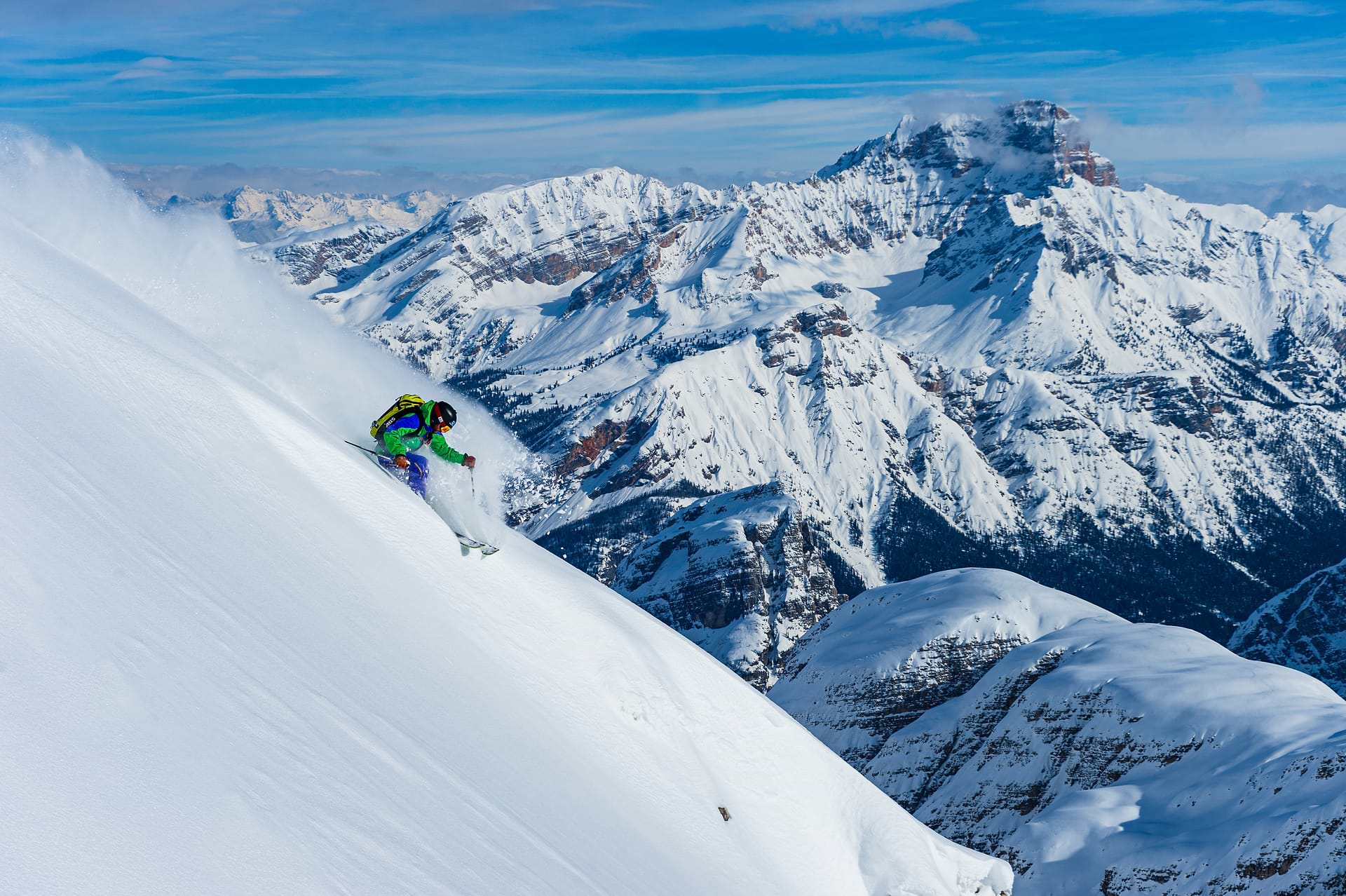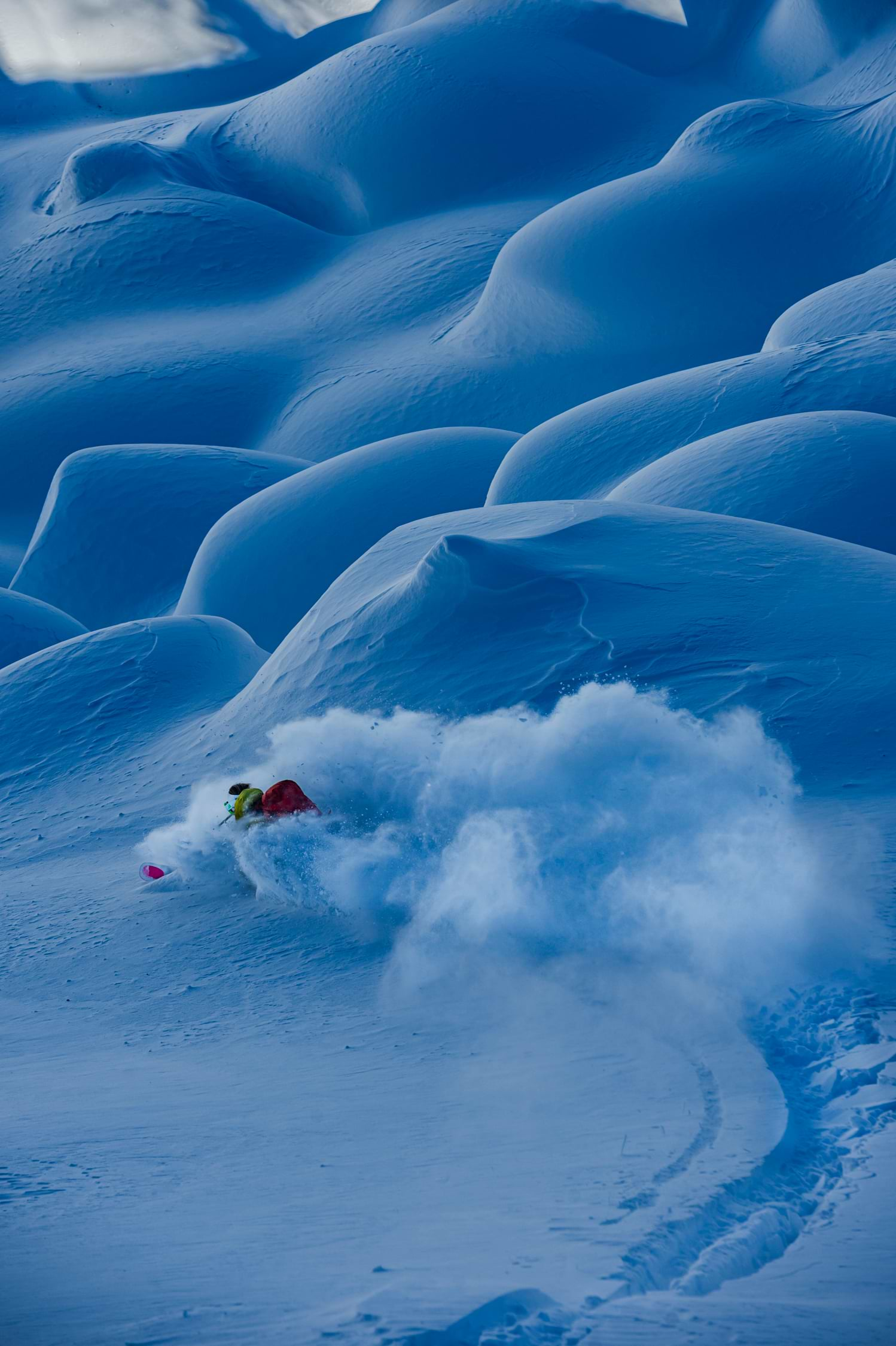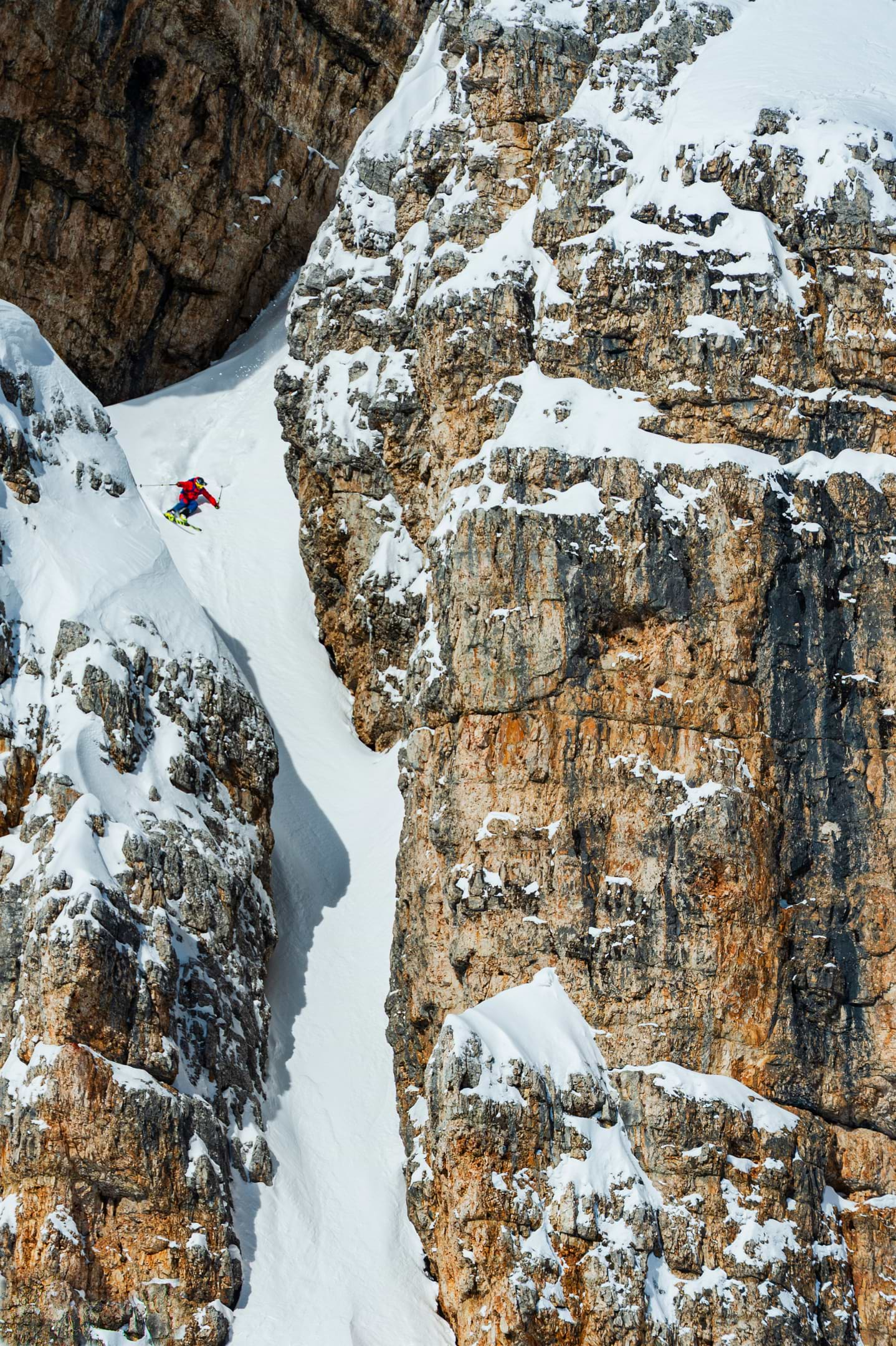
Mike Douglas takes flight at Faloria.
couloirs, the peaks of the Dolomites rise above Cortina d’Ampezzo like numerous limestone fortresses — many of which have historically served this purpose. Over the course of history, this rugged range has often acted as a battlement to fend off invaders. Since Cortina’s 1956 Winter Olympics, however, the only invaders are tourists, and the only thing contested by nations here involve who’s better at descending the mountains. A perennial stop on the Women’s World Cup, the Olympics returned in 2026, honouring both Cortina’s racing heritage and a commitment to dolce vita that has earned this long-reigning resort the title “Queen of the Dolomites.”
With 10,000 residents, Cortina is a true mountain town with a bustling life that goes beyond tourism, making it an authentic icon in the Alps.

Mike Douglas takes flight at Faloria.

After skiing, it’s almost essential to take a walk along Via Roma and stop by the church and the square.

When it snows in the Dolomites, it really dumps.

At the tram station atop Piccolo Lagazuói sits Rifugio Lagazuói, where you can enjoy lunch or even stay overnight.




Cortina’s four main ski sectors — Faloria-Cristallo-Mietres, Tofana-Socrepes, Lagazuoi, and Cinque Torri — are not only topographically distinct, offering varied snow conditions and ski experiences, but also part of the renowned Dolomiti Superski, whose single ticket grants access to 12 ski areas, 450 lifts, and 1,200 kilometres of pistes.

Gentle runs in the Socrapes area of Pomedes offer a perfect introduction to the Alps and are well-suited for advancing to intermediate slopes. More experienced skiers in this region usually head toward the race-grade Labirinti or Olimpia delle Tofane, where they can enjoy a rare moment of pause to admire the impressive rock buttresses, especially in the Tofanaschuss of Olimpia.

Stay high if it’s sunny, as many of Cortina’s slopes face south. Runs may be shorter, but you’ll find better snow — and breathtaking scenery. If you linger late in the day, the shifting colours of the Dolomites will show why it’s the most sunset-friendly range in the Alps.

When it’s storming outside, locals head to Cinque Torri, where the skiing is better sheltered. Although the area appears small and tight from the bottom, it’s like a Russian doll that not only opens up to the “five towers” named after it but also offers a treasure trove of gully and slot ski runs.
History is rich in the Dolomites, whether it involves ski racing, alpine architecture, or après-ski stories. It all begins at the village square and the cobblestoned Corso Italia pedestrian zone, with its landmark bell tower, beautiful buildings, spacious patios, and classic four- and five-star hotels.

Restaurants and bars around the square each have their own unique histories. For après-ski drinks, Enoteca Cortina — Italy’s first wine bar — is a must-visit for its excellent atmosphere and service. Clipper Bar is ideal for early evening, when it's less crowded, while Hotel de la Poste, the town's oldest hotel, offers a more sophisticated setting.

Pizza, that great appeaser of skier appetites, is everywhere. Pizzeria Ariston, located across from the bus station, is an outstanding, reasonably priced, family-owned spot with an excellent regional wine list. Also popular is Pizzeria Cinque Torri, known for its wide selection of pasta dishes.

If pizzerias seem too common, among Cortina’s top restaurants, you’ll find the well-known Alajmo Cortina and Michelin-starred favourites like Baita Fraina and Ristorante Tivoli.

Every region in Italy boasts its own pasta specialty. In Cortina, it's casunziei all’Ampezzana — ravioli shaped like half-moons filled with beets and poppy seeds, topped with melted butter, extra poppy seeds, and a generous sprinkle of Parmesan. While this dish is available at most local eateries, the best version is crafted by the Lorenzi family at Rifugio Scoiattoli on Cinque Torri.

Cortina boasts several renowned on-mountain restaurants, including Rifugio Lagazuoi, Cinque Torri’s Rifugio Averau (some of the best dining in the Alps) and Rifugio Pomedes.

Finally, we want to recommend an absolute gem of a grocery store called Soppelsa Carlo. This family-run grocery store specializes in authentic Italian products and has an impressive selection of cheese, ham, and wine.
Situated on a peaceful street, just a short walk from the Col Drusiè tram, the three-star Hotel Capannina is a classic mountain-style hotel featuring an original central building and a newer satellite wing with more modern rooms. With a long-standing atmosphere of rare elegance dating back to 1870, the four-star Hotel Cortina and its restaurant overlook the lively Corso Italia. Perched at 9,028 feet on the summit of Piccolo Lagazuoi, Rifugio Lagazuoi is one of the highest mountain inns in the Dolomites; rent a private room or bring your earplugs and join the ski-touring crowd in the bunks.

Established in 1870, Hotel Cortina is one of the oldest hotels in town.

Rifugio Lagazuói is the highest located mountain hut around Cortina.
The typical ski-safari emblematic of Dolomiti Superski can be seen atop Cinque Torri’s Averau Chairlift. From the col, ski down to the valley floor in the opposite direction, re-ascend to another pass, descend into a different valley, take a platter lift, and then ski back into Cinque Torri — all in less than an hour.
Rifugio Lagazuói, at the tram station on top of Piccolo Lagazuói, offers lunch, drinks, and overnight stays. You can exit along the scenic 11-km Armentarola Route through the Hidden Valley to Alta Badia or head back to Lagazuói’s base via the 'museum route” (see Don’t Miss).
If you’re a couloir enthusiast, Cortina is your spot. It’s an easy bootpack from the top of Tofana Chair to couloirs so large they could fit a small ski area, and on their massive aprons, you might spot Chamois. Note: those bootpacks are predominantly guided group runs, so you should definitely hire a guide before attempting them.
In January 1935, a snow shortage prompted the Italian Ski Federation to alter a downhill race near Lake Maggiore. The new, winding course with well-spaced gates quickly gained popularity and debuted a month later as the “Giant Slalom” at the national championships in Cortina. Known as Olimpia delle Tofane for the 1956 Olympic Winter Games, the course became a vital part of the Women’s World Cup, played a significant role in the 2021 Alpine Ski World Championships, and will also be featured at the Milano Cortina 2026 Olympic Winter Games.
Cortina d’Ampezzo is a key part of the Dolomites UNESCO World Heritage Site, which spans 141,903 hectares and includes 18 peaks over 9,842 feet. The range’s spires, pinnacles, rocky cliffs, vast valleys, glacial landforms, karst systems, and Mesozoic carbonate fossils create a breathtaking landscape of international geomorphological significance.

Experience a proper ski safari in the vast Dolomiti Superski area, the largest interconnected ski region in the world.

If you’re into skiing couloirs, you’ll love Cortina.

In February and March, Cortina will host the 2026 Olympic and Paralympic Games.
During WWI, Austria and Italy fought their infamous “battle of the caves” on the historic ridges of Piccolo Lagazuói. Ski troops from both sides dug tunnel systems into the 600-metre-high limestone face, allowing them to observe and defend their own front lines and ambush the enemy from below. Nowadays, you can explore these tunnels as an open-air museum either on skis or on foot.

The open-air museum, including the caves on the ridges of Piccolo Lagazuói, is well worth a visit.
Few ski resorts can claim that skiing has spread across such a large valley, and the west-to-east character, along with the varying terrain, aspects, and snow conditions of Cortina’s Faloria-Cristallo-Mietres, Tofana-Socrepes, Lagazuoi, and Cinque Torri sectors form their own universe within the Dolomiti Superski realm.
75 miles (120 km) of piste, plenty of off-piste
2
6,8 miles (11 km)
50%/35%/15%
35
118-126 inches (300-200 centimetres)
95%
5,594 ft (1,705 m); top elevation 9,613 ft (2,930 m)
Getting there: Not as easy to reach as many larger resorts in the Alps, Cortina is a 2-hour drive from Venice airport and 35 minutes from Dobbiaco train station. Transport options include car rental, private transfers, and buses.

LESLIE ANTHONY is a writer and editor who knows a thing or two about snow. Longtime Creative Director of SKIER, former Managing Editor of POWDER, and author of the book White Planet: A Mad Dash Through Modern Global Ski Culture, the resident of Whistler, British Columbia, continues to appear regularly on the masthead of the world’s top ski magazines. His favorite activity? Skiing powder, of course.
RELATED STORIES